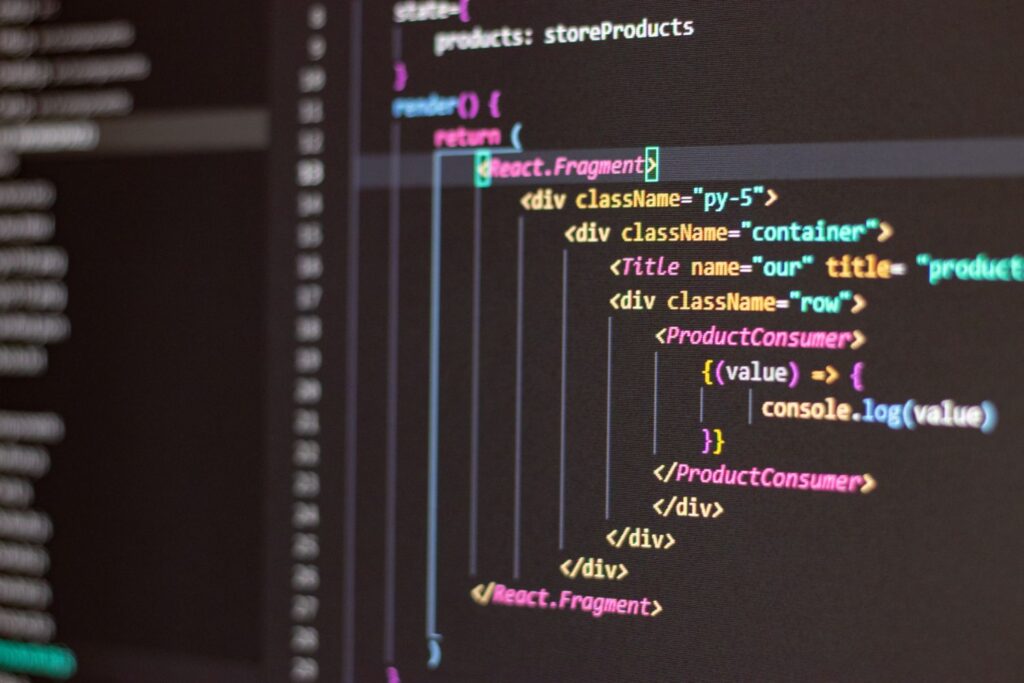This article highlights the differences between web developers and software developers. We’ll explore their roles, responsibilities, skills, and the industries they operate in.
Are you considering a career in coding but feeling unsure if you should pursue web development or software development? Many aspiring developers and career changers find themselves torn between these two exciting fields, with overlapping descriptions adding to the confusion. We identify the key distinctions.
Web developer careers

Web developers create and maintain websites that look good, function seamlessly, and provide excellent user experiences. They fall into three main categories:
Front-end developers
Front-end developers focus on the “client side,” i.e, everything the user interacts with visually. They use languages like HTML, CSS, and JavaScript to build interfaces and ensure a smooth user experience. They often collaborate closely with UI/UX designers.
Popular tools and frameworks used in 2026 include React.js, Vue.js, and Tailwind CSS. Front-end developers are also expected to know accessibility standards and responsive design to cater to mobile and user needs.
Back-end developers
These professionals work on the “server side,” managing databases, servers, and application logic. Their work ensures that websites can handle requests and serve real-time data. Back-end developers often use programming languages such as Python, Ruby, Java, or PHP.
Frameworks like Node.js and Django remain popular in back-end development as of 2026, along with expertise in cloud platforms like AWS and Google Cloud.
Full-stack developers
Full-stack developers are the “jack-of-all-trades” of web development, skilled in both front-end and back-end technologies. Companies value them, especially startups, for their versatility in building and maintaining complete web applications.
With the rise of low-code platforms in 2026, full-stack developers are leveraging these tools to streamline repetitive tasks and focus on innovative solutions.
Which sectors do web developers work in?
Common industries for web developers include e-commerce, digital marketing, media, and education. The demand for skilled web developers shows no signs of slowing, and the opportunities for remote work have expanded dramatically in recent years.
Software developer careers

Software developers design and build programs that power everything from computer operations to mobile apps and IoT devices. Their work often spans three key areas:
System software developers
These developers create operating systems and utility programs that optimise hardware performance. Their work supports essential functions at the core of modern computing. Tools like C++ and Assembly remain critical in this field.
Application software developers
This involves developing consumer-facing applications for desktops, mobiles, and tablets. Think productivity tools, games, or streaming platforms. Technologies such as Swift (for iOS) and Kotlin (for Android) dominate here.
Embedded systems developers
Specialising in building software for hardware devices (think automotive systems, smart home gadgets, or medical instruments), these developers work closely with hardware engineers. Popular tools include Python for prototyping and embedded C for production environments.
Which sectors do software developers work in?
While software developers work in almost every sector, industries like healthcare, banking, automotive, and technology remain key. Companies increasingly rely on software to innovate and improve efficiency, ensuring a steady demand for professionals in this space.
Key differences between web developers and software developers
While both roles involve coding, the scope, skills, and technologies they use vary significantly.
| Aspect | Web developer | Software Developer |
| Focus | Websites, web applications | System software, applications, IoT, embedded devices |
| Languages | HTML, CSS, JavaScript, PHP, Python | Python, Java, C++, C# |
| Frameworks | React.js, Vue.js, Node.js | Spring, Flask, TensorFlow |
| Industries | eCommerce, media, and education, but also applicable to any sector | Healthcare, finance, automotive, but also applicable to any sector |
| Devices | Primarily works on browsers | Works across multiple platforms (desktop, mobile, embedded) |
Overlapping skills and tools

Despite their differences, there’s a significant overlap between the two roles, which opens up opportunities for career flexibility.
Common skills between web and software developers
- Coding Languages: Both often work with Python and JavaScript.
- Problem-Solving: An essential skill for debugging and creating efficient solutions.
- APIs: Dynamic applications require both developers to know how to integrate APIs for data exchange.
- Version Control Tools: Proficiency in Git for managing code repositories is essential in both fields.
- Soft Skills: Communication and collaboration are critical since both roles require teamwork, especially in agile environments.
If you’re unsure where to start, a general-purpose coding course can help you build these foundational skills before specialising.
Future trends (2026): web and software development careers

In 2026, web and software development careers should continue to thrive, driven by emerging trends in both fields. In web development, serverless computing is gaining momentum, with platforms like Netlify and Vercel making the deployment of web applications more efficient and accessible.
Web3 and blockchain technology are transforming how websites manage security and decentralisation, while the integration of AI into websites is rapidly evolving to create more personalised user experiences.
On the software development side, AI and machine learning are becoming essential across a variety of industries, creating a growing demand for developers equipped with AI expertise. The development of IoT is also expanding as connected devices in smart homes and cities become more common.
Additionally, cybersecurity skills for software developers are increasingly critical as the need for robust data protection intensifies. Both the web and software development sectors are set for significant growth in 2026, with a strong demand for professionals who can adapt to and innovate within these cutting-edge trends.
Which path is right for you?

Choosing between a web developer career and a software developer career depends on your preferences and goals.
Web development might be right if you:
- Enjoy creating visually stunning designs and interactive features.
- Prefer short project cycles with measurable outcomes.
- Are interested in working in creative industries like digital media or marketing.
Software development might be right if you:
- Love problem-solving and working on complex, long-term projects.
- Want to explore emerging technologies like AI and IoT.
- Are keen to work in varied industries such as healthcare, finance, or automotive.
Not sure yet? Consider exploring our computing courses to gain exposure to both fields before making your decision.
Build your coding career with Access Creative Courses

The opportunities in web and software development are vast and growing. Whether you want to build cutting-edge websites or design the next groundbreaking app, the right training can put you on the fast track to success.
At Access Creative Course, our expert-led software development course equips aspiring developers with the skills they need to thrive in the tech industry. With hands-on projects and personalised mentorship, you’ll be fully prepared to launch your coding career.
Get started today and take the first step toward joining the next generation of tech innovators. Apply for our Software Development course online today!






